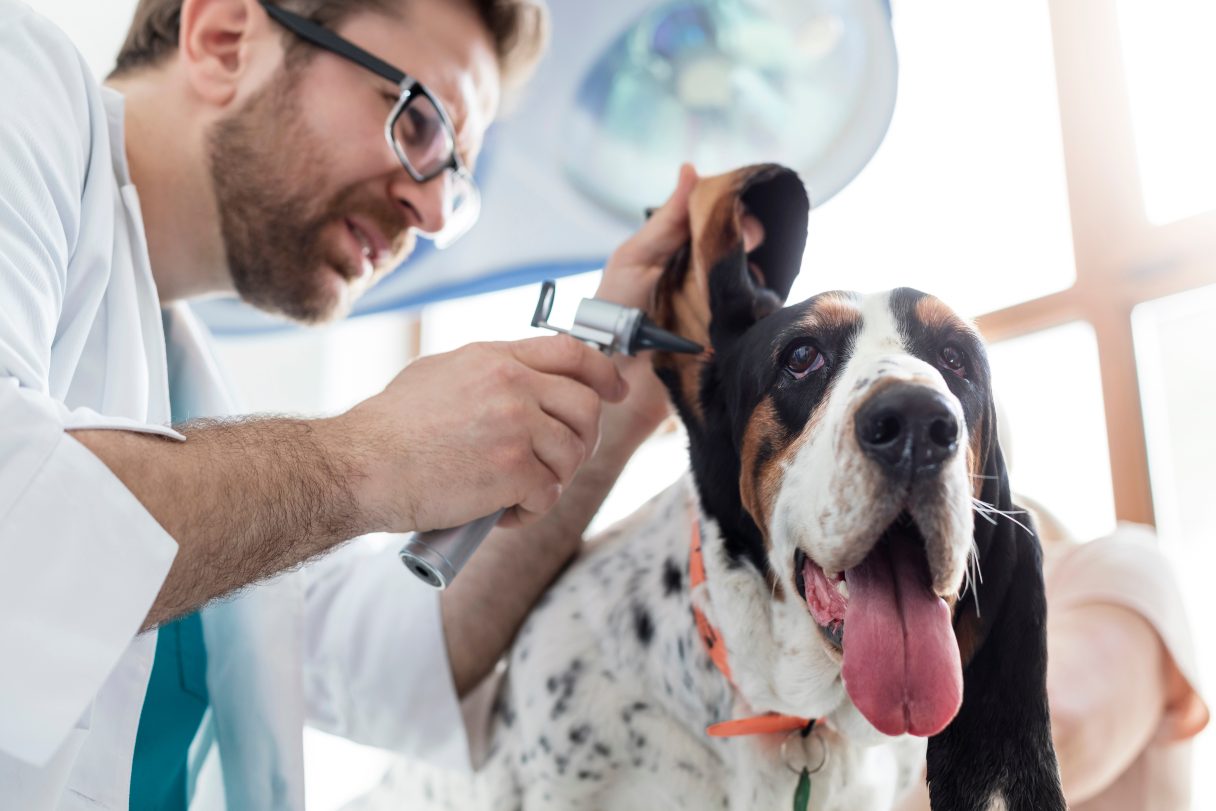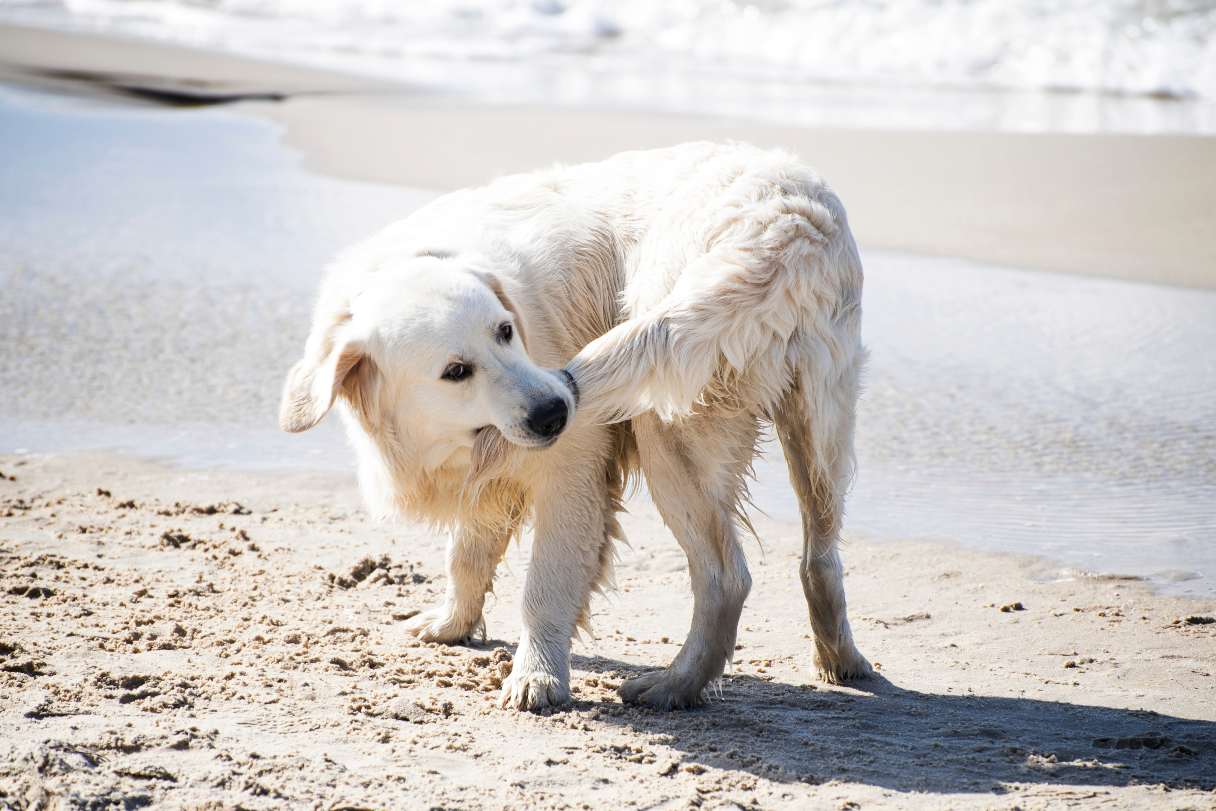Is your dog scratching more than usual? Are they shaking their head often or even rubbing their head along the walls or furniture? Are they licking their paws obsessively? These are all signs that your dog may be dealing with a common — but uncomfortable — condition called a yeast infection.1
What Is a Yeast Infection?
Also called yeast dermatitis or Malassezia dermatitis, a yeast infection occurs when there is abnormal growth of the fungus Malassezia pachydermatis. While yeast is naturally occurring on the skin, abnormal growth causes inflammation.2
Types of Yeast Infections in Dogs
There are three main types of yeast infections in dogs:3
- Paw infections
- Ear infections
- Skin infections
Yeast infections on a dog's paws
A yeast infection on your dog's paw can occur when dirt and moisture gets trapped between your dog's toes and pads. Certain grasses and weeds can set off allergies, and when your dog starts licking their paws, that adds more moisture and makes it even worse. Dogs may lick their paws for a variety of reasons, including anxiety, boredom, injury and more. Early diagnosis by your veterinarian will help you get to the root of the issue and reduce your dog's discomfort.3
Yeast infections in a dog's ears
A dog's ear canal is the perfect shape to foster a dark, warm and moist environment for Candida and Malassezia yeasts to thrive. Dogs with floppy ears who also like to swim (think Labrador retrievers or golden retrievers) are more likely to get yeast infections.3
Early diagnosis is really important if you think your dog has an ear yeast infection. Without treatment, the infection can go deeper into the ear and cause complications like hearing loss, vestibular imbalance or neurological damage.3
Yeast infections on a dog's skin
A skin infection can occur anywhere on your dog's body but is more common in dogs that have wrinkly skin or skin folds, like the Chinese shar-pei. If left untreated, a skin infection can spread and affect your dog's entire body.3
Causes of Yeast Infections in Dogs
Dogs can develop a yeast infection from allergies, an increase in the oils produced on the skin, a suppressed immune system, if they are on immunosuppressive drugs such as corticosteroids (steroids) or a hypersensitivity to yeast.2 Paw or ear yeast infections can also occur from moisture or dirt getting trapped.3 In some cases, ear infections can be a result of damage to the eardrum or a polyp, mass or tumor in the ear canal.3
It's important to note that dogs can't get a yeast infection from another dog (or spread it to another dog). The infection will calm down once the underlying cause is addressed.2
Some breeds are more susceptible to getting yeast infections based on their ear structure or type and body types, including:3
- West Highland white terrier
- Basset hound
- Cocker spaniel
- Silky terrier
- Australian terrier
- Maltese
- Chihuahua
- Poodle
- Shetland sheepdog
- Lhasa apso
- Dachshund
- Golden retrievers
- Labrador retrievers
- Miniature schnauzers
- Bichon frise
- Shih tzu
Symptoms of Yeast Infections in Dogs
Some symptoms of a yeast infection are the same regardless of the type your dog may have. Common yeast infection symptoms in dogs include:3
- Swelling
- Redness and/or irritation
- Itching
- Discharge
- Musty odor
Other specific symptoms of a yeast infection in a dog will likely be based on where the infection is found on the body.
Yeast infection on dog paws
Here are typical symptoms of yeast infection on a dog's paws:3
- Brown discharge in the nail beds
- Pink staining on the hair around the paws
- Hair loss
Ear yeast infection
Here are typical symptoms of yeast infection in a dog's ears:3
- Scratching or digging at the ears
- Rubbing their head on the floor, wall or furniture
- Frequently shaking their head
- Crusty skin on the ear flap
- Hair loss around the base of the ear
Skin yeast infection
Here are typical symptoms of yeast infection on a dog's skin:3
- Greasy, crusty or flaky patches
- Thickening skin
- Darker skin color
- Hair loss
Diagnosing Yeast Infections in Dogs
If you think your dog has a yeast infection, it's essential to get a veterinary examination as soon as possible to get the proper treatment and avoid any complications.
Your vet will take a sample of the infected area with a dull blade and examine the specimen under a microscope to confirm the presence and type of yeast.1 Your vet will also check for any bacterial infection or mange (skin mites).1 If your vet suspects yeast hypersensitivity, they may also recommend more skin tests and/or blood tests.2
Treatments for Yeast Infections in Dogs
Depending on the severity of the infection, your vet may prescribe an oral treatment, topical treatment or both.2
Oral treatments may include antifungal medications and/or antibiotics. While antibiotics are typically prescribed for four to 12 weeks, antifungals need to be taken for several months to be effective. Antifungal drugs can be hard on the liver, so monitoring with routine blood tests is important. Your vet may also prescribe a corticosteroid to help with discomfort and inflammation while the other drugs are kicking in.2
Topical antifungal medications can come in the form of prescription lotion, cream, spray or wipe and include miconazole, clotrimazole, ketoconazole, climbazole and terbinafine.1
Costs to treat yeast infections in dogs
Costs for oral and topical medications can vary based on your location and the medication. Oral medications start as low as $0.64 per 250-milligram tablet.4 Topical medications can run from about $6.50 to $262.5
Another topical treatment includes an initial bath with a shampoo containing selenium sulfide or benzoyl peroxide, followed by an antifungal shampoo every three to five days for two to 12 weeks.2 Shampoo costs typically range from just under $10 to close to $50.6
Always consult your vet before trying at-home remedies or changing your dog's diet. Some methods may be effective, while others may cause your dog even more discomfort.
Preventing Yeast Infections in Dogs
While you may not be able to cure your dog's allergies or sensitivities, controlling the underlying problem is key to keeping yeast infections at bay.2 That being said, too much moisture is a common cause of yeast infections, so be sure to thoroughly dry your dog's ears after swimming or bathing.3
As soon as you notice signs of a yeast infection, take your dog to the vet to get them checked out before it gets worse.
CareCredit Credit Card Financing for Dogs
Taking good care of your pet's well-being from nose to tail is essential. Make sure to stay up to date on their regular checkups at the vet to help keep your pet happy and healthy for a lifetime of love. You can use your CareCredit credit card for pet care throughout the year for routine veterinary services as well as emergencies and surgeries.* Use our Acceptance Locator to find a veterinarian near you that accepts CareCredit.
CareCredit is there for you and your pet every step of the way; continue your wellness journey by downloading the CareCredit Mobile App to manage your account, find a provider on the go and easily access the Well U blog for more great articles, podcasts and videos.
In addition to pet care, you can also use your CareCredit credit card for dentistry, cosmetic, vision, hearing, health systems, dermatology, pharmacy purchases, spa treatments and so much more within the CareCredit network. How will you invest in your health and wellness next?
Author Bio
Abbie Mood is a freelance writer with more than 10 years of experience. She has worked with clients of all sizes to create compelling content and she has written for the American Kennel Club, Marriott Bonvoy, Women's Health Online, Headspace and more.







